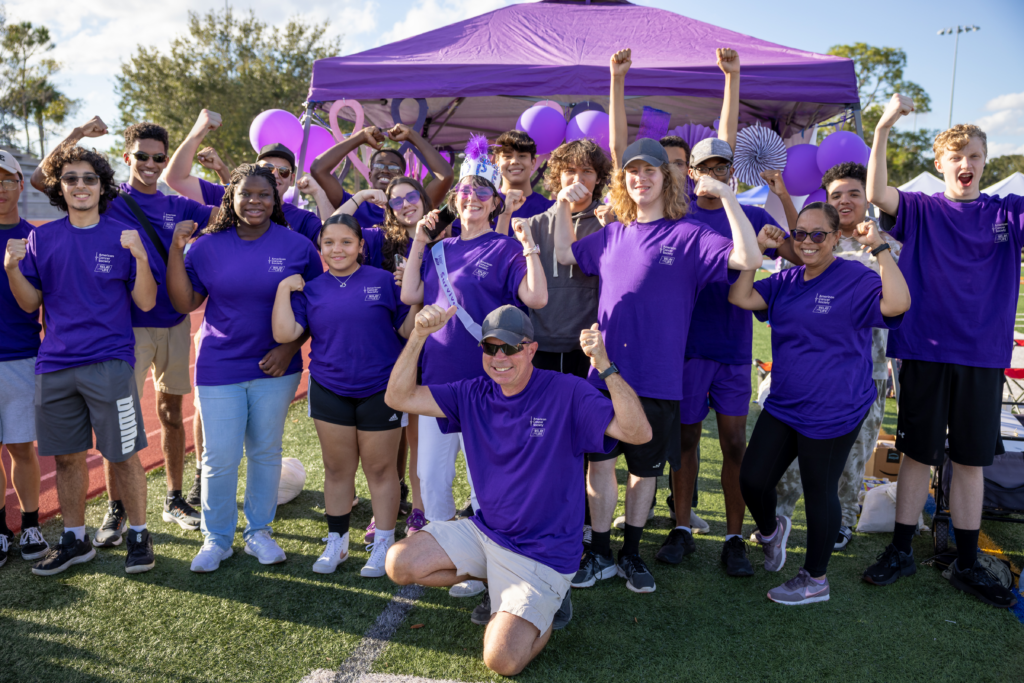Leading Your ELT

In addition to recruiting your committee, it is your role as the Event Lead to lead your ELT. This means you prepare meeting agendas, lead the meetings, communicate with ELT members outside of meetings, track progress and hold members accountable for their goals and strategies, and recognize the achievements of the group.
Empowering Your ELT
Take ownership of being a leader by scrutinizing your own leadership style and learning to work with different types of people in different situations. Delegate tasks and allow your ELT members to take ownership of their individual focus areas.
Empower your ELT members to do their jobs – empowered ELT members are more effective, innovative, and bring about transformational change. When ELT members have your trust and ownership over their tasks, they will make your Relay a success every year!
Use your staff partner as a support in this role, but do not rely on them to lead your ELT for you. You were recruited into this position because you have proven leadership abilities and potential…this is your chance to use them for a great cause!
Creating a Positive Team Dynamic
Work with your Staff Partner for possible facilitators or other ideas for implementing your workshop.
Your Staff Partner and ACS can help with printing the workbooks for your ELT members.
Spend some time with your ELT as a whole group early in the Relay season so you can get to know each other and get a feel for how you might work together. Some members of your ELT will probably already know each other well, while others may not know anyone on the committee. Taking time to build a positive team dynamic through social interaction will help your Relay as you move through the planning season.
Everyone in the room already has one big thing in common – they want to fight back against cancer. Start there and foster an atmosphere where everyone feels welcome and empowered to make a big impact in your community.
One way to do this is using the ELT retreat concept, where your ELT gets together for a few hours early in the season and spends time getting to know each other and doing some high level planning together. It doesn’t matter whether members of your ELTs are seasoned Relayers or if they are relatively new, everyone can benefit from being a part of the retreat. The success of our Relay For Life events is dependent on volunteer leadership being a part of goal setting, actionable recruitment strategies, and creating best-in class event experiences.
The RFL ELT Impact Workshop Guide and Workbook can be used to plan your ELT’s retreat – whether it’s in person or virtual. The facilitator guide and workbook are both available on ACSR.
Training & Preparing Your ELT
While we have job descriptions for our ELT roles, handing someone a “to do list” isn’t the best way to prepare them for their role. Have a conversation with each of your ELT members to ensure they understand what they’re responsible for, what kind of deadlines they have for tasks, and where they can find support and help. Give them a chance to ask any questions they have or share any ideas they’re considering (this could be the same conversation as going through a Partnership Agreement). Many ELT roles have other training required (ex: Accounting, Online) while the rest need access to resources and a setting to gather ideas and ask questions of other volunteers doing the same role (ex: Teams, Marketing).
Ideally, previous ELT members will share their knowledge and materials with a new person moving into their role, but not everyone is great at making notes and passing them along. However, former ELT members are also a great resource for those new to the ETL or new to their role for this season.
Ensure that all your ELT members know about ACSResources.org and that this site is our library of planning resources, training videos, templates for materials, as well as the latest information on what’s happening with Relay at a national level. Below are the best places for your ELT members to find resources and video trainings. The training end goal is to have all your ELT members feeling comfortable and empowered in their role so they can do their part of make your Relay successful.
RFL on ACSR
Training Library
Campus Library
ACS Staff Partner
Delegating Tasks to your ELT

As Event Lead, do not let yourself get drawn into doing a lot of little things and making little decisions for the Relay. Allow your ELT members to own their roles and responsibilities. Save your time to help your ELT members with the truly critical aspects of planning the Relay.
Your role is to communicate regularly regarding these critical items, make sure your sub-committees are moving forward, and provide the help and support as needed to make these happen.

Do Not Try To Plan Relay All By Yourself!
Event Leads who try to make every decision end up overworked and burned out, and they can frustrate and alienate their ELT as well. Trust the people who you recruited to be on your committee. If you truly established your expectations of one another during your Partnership Agreement conversation, then trust they will come through for you and allow them to fulfill their role on the committee.
As tasks come up during the season that fall into one of their committee focus areas, delegate the task instead of taking all the little things on yourself. As an Event Chair, you have enough to keep track of with the critical aspects of the Relay and problem solving where needed. You’ve recruited all these willing volunteers to your ELT – let them fulfill their roles.
When you delegate correctly, not only does it keep you from getting burned out, but it also stimulates your ELT members to high achievement and frees up your time to concentrate on the “big picture” during the Relay season. Delegating requires a balance between giving your ELT members enough space to complete the task, while still monitoring their progress. Trust but verify!
Prepare to Effectively Delegate
Prepare to delegate effectively by considering each of these topics before delegating a task. When making the ask to your ELT member, explain why they are the right person to complete the task, what the goal of the task is, and how you both can track progress and offer support. Consider:
- The specifics of the task or job to be delegated.
- The experience, knowledge, and skills of the individual as they apply to the delegated task.
- How this person works best. What do they want from their volunteer experience? How do they view the work?
- The current workload of this person.
- The project’s timelines/deadlines. How much time is there available to do the job? Is there time to redo the job if it’s not done properly the first time? What are the consequences of not completing the job on time?
- Resources for this person as they work to complete the task.
- Your expectations or goals for the task. How important is it that the results are of the highest possible quality? Is an “adequate” result good enough? Would a failure be crucial? How much would failure impact other things?
- The role you play as the person who is delegating in ensuring the project’s success, through ongoing monitoring, support, coaching, the providing of resources, and so on.
- Appropriate mechanisms for tracking the project. When should you set checkpoints and report-backs to make sure that things are going smoothly?
Episodic Volunteers
If you find your ELT members are not able to take on more tasks, then you may need to look in to recruiting some additional people, or creating some Episodic Volunteer Projects to help get everything done.
Motivating & Supporting Your ELT
Meetings

Words of Wisdom
Meetings should have as few people as possible, but all the right people.
– Charles W. Scharf
Running ELT Meetings
Your planning meetings are extremely important to the success of your Relay For Life event. ELT meetings are a time for the ELT to strategically plan and manage your Relay in a proactive and ongoing manner. Meetings should celebrate progress, focus on action items, and be a time to share ACS’s mission. As an Event Chair, if you lead focused, organized, effective, and fun committee meeting, you will set the tone for the entire Relay For Life event.
As a reminder, ELT meetings should not be a place for group decision making, which can be time consuming. Committee meetings should be a time where Sub-Committees report on progress and share information that pertains to the whole group. Decisions on different Relay items should be made by the Sub-Committees outside of the committee meetings.
Here are some things to think about when preparing for your ELT meetings:
Purpose
Who attends
When to Hold Meetings
Meeting Location
Meeting Agendas
Having an agenda for each meeting will help your ELT stay on track during the time you have without forgetting something important. If you’re not sure what to put on your agenda each month, think about what’s been going on for your ELT and start there. Think about what’s coming up as well, and go from there. Your staff partner can help you with meeting planning, if you need more guidance.
Check out the More Than A Meeting overview for tips on hosting ELT meetings and a bunch of sample agendas to get you started.
Communication Outside Meetings
This is an important part of leading your ELT. Be sure to communicate regularly to the whole group outside of meetings and also to communicate regularly one on one outside of meetings. This one on one communication will allow you to track progress on tasks and also give you a chance to build a personal relationship with that member.
Chose a form of communication that works well for the group. For many, this might be email, but keep in mind that not every one is tied to their inbox all day. If you know someone isn’t good about checking their email, ask them what’s the best way to communicate with them (or, agree upon a method during your Partnership Agreement discussion). Other communication options could include texting, a private Facebook group, a group chat / text app – chose something that works for your ELT!


If you do not communicate with ELT members outside of meetings, you run the risk of having some members slip through the cracks. You may think they are working on specific things, but in reality they come to meetings, give a wishy-washy report and never actually accomplish their tasks.
You could also run the risk of losing valuable ELT members because they don’t feel important to the group. So, take the time to contact each ELT member one on one outside of meetings, preferably through phone calls or face to face interaction.
CAMPUS – encourage your sub-committee chairs to host in-person or virtual meetings with their members so they have time to talk through their projects, share ideas with each other, and build their team.
Recognizing Your ELT
All volunteers like to be noticed and appreciated for their unique contributions, especially within an ELT. Because Relay For Life is a volunteer-driven event, it is imperative that all volunteers feel recognized and appreciated. When this occurs, it will improve their satisfaction levels with their volunteer experiences, improve their productivity as ELT members, and improve the chance they want to keep volunteering in the future.
There are many organizations out there who need volunteers. Recognition is one way we can keep our amazing volunteers engaged with Relay For Life and the American Cancer Society. It is also simply the right thing to do, since these volunteer roles take a lot of dedication and we are truly grateful for their amazing efforts. Your staff partner is always available to help you recognize your ELT members.
As an Event Chair, it is important that you personally notice and recognize the individual contributions of each of your committee members, and encourage them to recognize their Sub-Committee partners and the Team Captains. There are many ways to effectively recognize volunteers.
